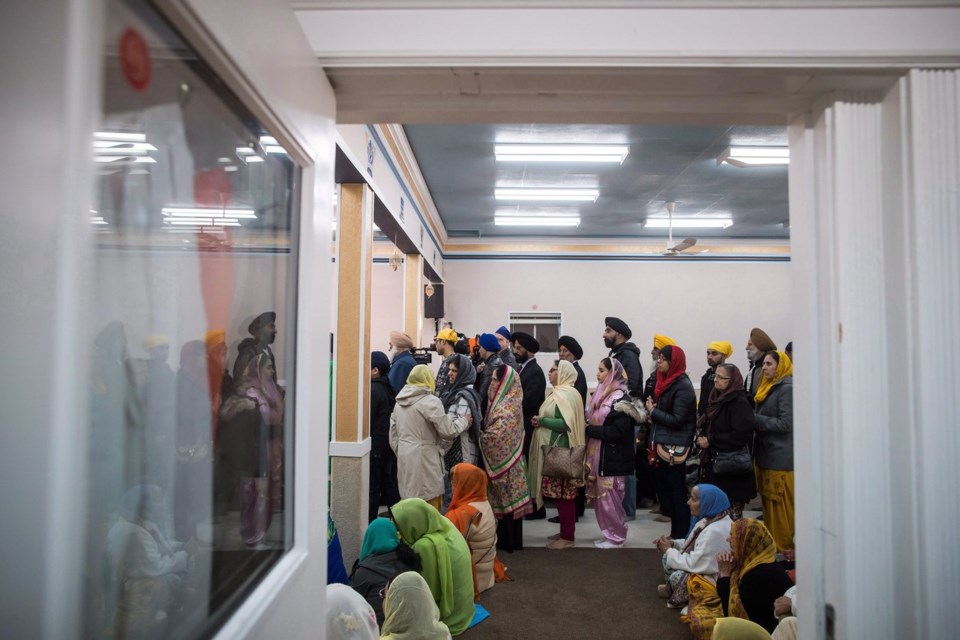VANCOUVER — A B.C. Supreme Court judge has granted an order to establish a buffer zone around one of the province's largest Sikh temples this Saturday in advance of expected confrontations between protesters and Indian consular officials.
The Khalsa Diwan Society, which runs the Ross Street Gurdwara, says in court documents that it expects "intense protests" at two "consular camps" scheduled for Nov. 2 and Nov. 16 after the RCMP made allegations about Indian officials' involvement in criminal activity in Canada.
The court documents say the camps give seniors of Indian descent a chance to meet with consular officials to complete administrative tasks, mostly related to their pensions, without having to attend the consulate in Vancouver.
Six Indian diplomats were expelled from Canada last month over allegations that they used their position to collect information on Canadians in the pro-Khalistan independence movement and then pass that on to criminal gangs who targeted the individuals directly.
The movement is an effort to create a separate homeland for Sikhs in India's Punjab region.
The society says in the court documents that Â鶹´«Ã½Ó³»police have plans to deploy "significant resources" for crowd control.
"The society expects that the consular camps … will draw intense protests from individuals who believe that all Indian consular offices should be shut down in Canada, and that consular officials should not be allowed to enter the Ross Street Gurdwara in furtherance of official business on behalf of the Government of India," the documents say.
The advocacy group Sikhs for Justice issued a statement Friday saying it would "counter" the Â鶹´«Ã½Ó³»camp, as well as one scheduled for Sunday in Surrey, B.C.
The protestors say the camps are to issue documents verifying the eligibility of Indian pensioners living abroad to continue receiving their pensions, but allege they are also used to monitor and gather information on Sikhs who are in favour of an independent homeland of Khalistan within India.
They say proxies posing as observers endanger the safety of Sikh activists.
Earlier this week, deputy Foreign Affairs Minister David Morrison confirmed a report that Canada is alleging an Indian cabinet minister and close adviser to Indian Prime Minister Narendra Modi ordered intelligence-gathering operations targeting Canadians.
The Washington Post first reported that Canadian officials alleged Indian Home Affairs Minister Amit Shah was behind a campaign of violence and intimidation targeting Sikh separatists in Canada.
Nathalie Drouin, the prime minister's national security adviser, told a National Security Committee on Tuesday that Canada has evidence the Indian government first gathered information on Indian nationals and Canadian citizens in Canada through diplomatic channels and proxies.
She said the information was then passed along to the government in New Delhi, which allegedly works with a criminal network with links to homicides, assassination plots, coercion and other violent crimes in Canada.
General counsel for Sikhs for Justice, Gurpatwant Singh Pannun, said in the statement that Prime Minister Justin Trudeau should limit Indian consular activities to their official premises because operations conducted outside the consulates expose pro-Khalistan Sikhs to targeted threats and surveillance.
The B.C. court documents say protests at last year's camps meant police officers had to use a "decoy plan" to escort consular staff out of the gurdwara from a side door to avoid confrontations, and things have intensified since then.
Those protests were months after the murder of Hardeep Singh Nijjar, president of a gurdwara in Surrey, B.C., and proponent of a non-binding referendum on the quest for the independent homeland.
Trudeau told the House of Commons there is credible intelligence about a potential link between India’s government and the killing of Nijjar.
The court order prohibits protesting, blocking the sidewalks or intimidating anyone trying to enter the property within 50 metres of the roads surrounding the temple from 8 a.m. to 6 p.m.
This report by The Canadian Press was first published Nov. 1, 2024.
Ashley Joannou, The Canadian Press


